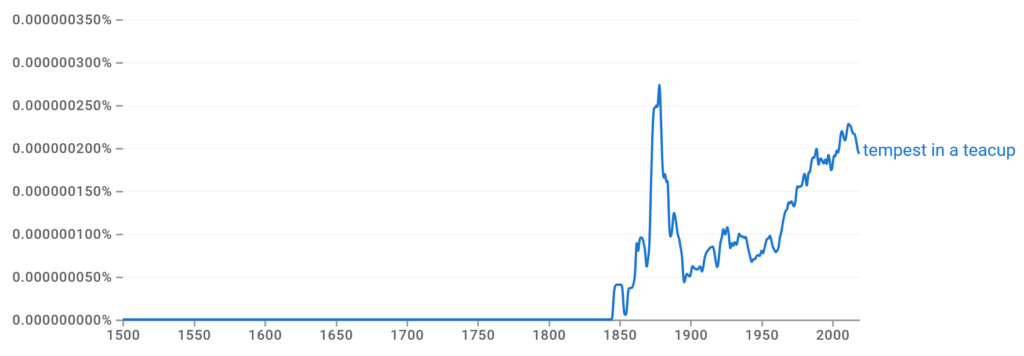Tempest in a teapot means an exaggerated uproar over a minor or trivial matter. It’s a phrase that humorously illustrates how a small matter can sometimes be exaggerated, causing unnecessary fuss or drama. Metaphorically speaking, this idiom is a classic reminder to keep perspective and not let minor issues become major problems.
An idiom, such as tempest in a teapot, is a group of words whose combined meaning differs from the literal meanings of the individual words. Idioms add depth and cultural nuances to language, fostering effective communication and enhancing language proficiency.
However, an idiom is only as good as its execution. Understanding the ins and outs of each one will help you use them correctly. So, my guide covers the phrase’s deeper meaning, origin, usage in different contexts, variations, and even a few alternatives. At the end, test yourself with the short quiz! Let’s get started!

What Does the Idiom Tempest in a Teapot Mean?
The idiom tempest in a teapot refers to a situation where there is a great deal of fuss or excitement about something that is not as significant or serious as it seems.
Merriam-Webster Dictionary defines the idiom tempest in a teapot as “a great commotion over an unimportant matter.” The Cambridge Dictionary has a similar definition, but with a bit more detail, stating it means “a lot of unnecessary anger and worry about a matter that is not important.”
When it comes down to it, the phrase is just meant to describe a situation where a minor issue is blown out of proportion, akin to a small storm brewing in a teapot. It’s mostly used to highlight the overreaction to trivial matters.
As a parent of two kids who were once toddlers, I understand the sentiment behind this phrase all too well. Kids tend to be little storms in a teapot themselves, ready to lose their minds over something as trivial as dropping their sippy cup on the floor.
But don’t kid yourself. I’ve known adults who behave this way, too. I might even be guilty of it myself. I deal with high anxiety, and when I’m overwhelmed from all sides, I sometimes freak out over the littlest things. That’s a tempest in a teapot, in a nuthell.
Variations of the Idiom
Most variations come from regional differences and uses, pitting American English against British English. These different variations of the idiom all have the same basic intent and can be used interchangeably in similar contexts.
- Tempest in a teacup (American English)
- Storm in a teapot (British English)
- Storm in a teacup (British English)
How Is Tempest in a Teapot Commonly Used in Context?
You can find this idiom used in personal and professional contexts to express that someone is overreacting or that an issue is being blown way out of proportion.
In the following sections, we’ll delve into various scenarios illustrating its usage, offer tips for effective application, and identify common contexts where it is employed.
What Are the Different Ways to Use Tempest in a Teapot?
- Casually in social situations: To advise someone not to overreact, for example, “You’re making a tempest in a teapot over a simple misunderstanding about barbecue sauce.”
- In the workplace: To put minor issues in perspective. “Let’s not create a tempest in a teapot over this small error that we can easily fix.”
- In daily life: To mock the exaggeration of trivial matters. Example: “Don’t turn every small setback into a tempest in a teapot; it’s counterproductive.”
What Are Some Tips for Using Tempest in a Teapot Effectively?
- Use it to bring perspective to a situation where someone is clearly overreacting.
- It’s an excellent phrase for diffusing the tension in almost any situation by highlighting the triviality of the matter.
- Be cautious not to belittle genuine concerns or problems by labeling them as a tempest in a teapot because you could risk seriously offending someone or downplaying their pain.
Where Can You Find Examples of Tempest in a Teapot?
I’ve seen this idiom appear in movies and books over the years, although not as frequently as one might expect. It’s not a super common phrase, but there are a few places you can find it in use.
If you were a Disney Channel Kid, you might remember the season-one episode of Jessie in 2011 titled “Tempest in a Teacup.” The premise deals with the characters getting stuck in a teacup billboard, and chaos ensues.
However, it’s also used in some online publications, including:
-called ‘Ahn wind’ is more than a tempest in a teapot,” said Lee Taek-soo, head of Realmeter. (The Korea Joongang Daily)
EASA panic storm in a teacup (The Bangkok Post)
What Is the Origin of the Idiom Tempest in a Teapot?

Tempest in a teapot originated from the 17th century. It’s thought to derive from a similar metaphor used by the ancient Roman philosopher Cicero. In his literary work “De Legibus,” Cicero referred to a storm in a ladle.
There are also variations of this idiom found in other cultures. For instance, the Dutch use the phrase storm in a glass of water, and the Hungarians say tempest in a potty.
The idiom appeared in English literature as early as 1678, when the Duke of Ormond wrote a letter to the Earl of Arlington. He used a similar expression, stating, “Our skirmish…is but a storm in a cream bowl.”
How Did the Idiom Evolve Over Time?
Specifically, tempest in a teacup didn’t slip into the English language until the 1800s, but there have been versions of the idiom in use for centuries. Eventually, the idea of the phrase has evolved into a popular metaphor for describing situations where small issues are given more attention or importance than they deserve.
What Are Some Related Terms to Tempest in a Teapot?
Use synonyms when you want to express the same idea without employing the exact idiom, and use antonyms when you wish to share the opposite intent.

Synonyms
- Making a mountain out of a molehill
- Blowing things out of proportion
- Overreacting
- Exaggerating
- Overdramatizing
- Overplaying
- Dramatizing
Antonyms
- Downplaying
- Minimizing
- Understating
Storm in a Teacup: Test Your Knowledge!
Choose the correct answer.
What Have We Learned About Tempest in a Teapot?
Tempest in a teapot is a vivid idiom that serves as a gentle reminder not to get carried away with minor issues. It encourages us to maintain perspective and focus on the things that truly matter.
We went over details about its meaning and origin, explored variations, and shared some synonyms you can use. I hope my guide helped you understand this idiomatic phrase better!
Remember, not every minor issue requires a tempest. For more idiomatic wisdom and language insights, I invite you to explore my other guides and articles on Grammarist!
